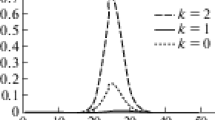Abstract.
The efficiency of a sequential data assimilation scheme relies on the capability to describe the error covariance. This aspect is all the more relevant if one needs accurate statistics on the estimation error. Frequently an ad hoc function depending on a few parameters is proposed, and these parameters are tuned, estimated or updated. This usually requires that the covariance is second-order stationary (i.e. depends only on the distance between two points). In this paper, we discuss this feature and show that even in simple applications (such as one-dimensional hydrodynamics), this assumption does not hold and may lead to poorly described estimation errors. We propose a method relying on the analysis of the error term and the use of the hydrodynamical model to generate one part of the covariance function, the other part being modeled using a second-order stationary approach. This method is discussed using a twin experiment in the case where a physical parameter is erroneous, and improves significantly the results: the model bias is strongly reduced and the estimation error is well described. Moreover, it enables a better adaptation of the Kalman gain to the actual estimation error.
Similar content being viewed by others
Author information
Authors and Affiliations
Rights and permissions
About this article
Cite this article
Sénégas, J., Wackernagel, H., Rosenthal, W. et al. Error covariance modeling in sequential data assimilation. Stochastic Environmental Research and Risk Assessment 15, 65–86 (2001). https://doi.org/10.1007/PL00009788
Issue Date:
DOI: https://doi.org/10.1007/PL00009788




